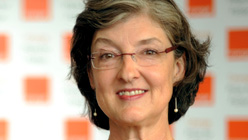Every winter, millions of Monarch butterflies migrate to Mexico. But what if climate change altered their course and redirected them to a small town in Tennessee? That’s the story of Barbara Kingsolver’s latest book, “Flight Behavior.” The author of “The Poisonwood Bible” joins us to talk about her background as a scientist, and to share her thoughts on climate change.
Interview Highlights
On the Question at the Center of 'Flight Behavior'
The question was this: How is it that we can all look at the same set of facts and come away with different ideas about what we've seen, different ideas about truth? This is a novel about science versus, faith, truth, belief and non-belief, rural and urban. It's about all kinds of divides and the difficulty of conversing across these divides. How can we do that, I suppose is the question.
On Farmers and Climate Change
I live in southern Appalachia, in the place where this book is set. I live among farmers who are getting socked year after year now with unprecedented weather events and farmers are the first to suffer from unpredictable weather. We are already suffering grave economic losses in our region and these same farmers are perhaps the people in our country who are least prepared to understand or talk about or even believe in climate change. That is a conundrum that I have been looking at every day of my life where I live.
On Humans' Irrationality
All of us that are human are perhaps less rational than we would like to think. We think that we look at the evidence and then decide what's true. What we really do, I think is decide what's true and then look for facts that support it. Then how do decide what's true and fundamentally.
On Where People Get Information They Trust
I think we absorb our truths from people we trust. We get them from our families first, from our spiritual communities, from our book clubs, our Facebook friends, our sort-of preselected group of people who we feel are on our side. And from them we sort-of absorb our truths, especially [from]the leaders of these tribes.
On Loaded Words and Teaching Evolution
So many words are loaded. Years ago when I was a biology teacher,I found when I was teaching evolution that I could spend three class periods talking to my students about natural selection, about genetic diversity, about [how] there are more offspring than survive, why some survive and some don’t, and I could teach the whole thing without using that word. And then when we’re done you say “Guess what this was?” And then half the class will stand up and say, “Oh, I’m not supposed to believe in that?” And then I would say, “But, do you?”.
- More: About the book “Flight Behavior” – at IndieBound.org
